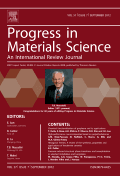
PROGRESS IN MATERIALS SCIENCE
Scope & Guideline
Empowering Research in the World of Materials
Introduction
Aims and Scopes
- Materials Synthesis and Characterization:
Focuses on novel methodologies for synthesizing and characterizing materials, including advanced techniques like 3D printing, nanofabrication, and additive manufacturing. - Energy Storage and Conversion:
Covers research on materials for energy applications, including batteries, fuel cells, and supercapacitors, with an emphasis on improving efficiency and sustainability. - Biomaterials and Biomedical Applications:
Explores the design and application of materials for medical use, including drug delivery systems, tissue engineering, and wound healing technologies. - Functional Materials for Electronics and Optics:
Investigates materials that exhibit unique electronic, optical, or magnetic properties, suitable for applications in sensors, photonics, and flexible electronics. - Environmental and Sustainable Materials:
Highlights research on materials that contribute to environmental sustainability, including waste reduction, recycling, and bio-based materials. - Nanomaterials and Nanocomposites:
Focuses on the synthesis, properties, and applications of nanostructured materials and their composites, exploring their potential in various fields.
Trending and Emerging
- Sustainable and Green Materials:
There is a growing emphasis on developing eco-friendly materials and processes, including biodegradable polymers and materials derived from renewable resources. - Advanced Energy Storage Solutions:
Research on next-generation energy storage systems, such as solid-state batteries and supercapacitors, is gaining traction, focusing on efficiency, safety, and sustainability. - Biomimetic and Bioinspired Materials:
The exploration of materials that mimic natural systems is on the rise, with applications in healthcare and engineering, reflecting a broader interest in nature-inspired design principles. - Machine Learning in Materials Science:
The application of machine learning techniques for materials discovery and optimization is increasingly popular, indicating a trend towards computational materials science. - Multifunctional Materials:
Research is trending towards materials that serve multiple functions, such as sensors that can also act as energy storage devices, indicating a convergence of various material properties for innovative applications.
Declining or Waning
- Traditional Metal Alloys:
Research on conventional metal alloys has seen a decrease as the focus shifts toward advanced materials such as high-entropy alloys and nanocomposites that offer superior performance. - Low-Dimensional Materials:
While previously a hot topic, the exploration of low-dimensional materials is becoming less frequent, possibly due to the saturation of research and a shift towards more complex materials systems. - Basic Polymer Science:
The foundational studies of polymer science are becoming less prevalent as the journal emphasizes innovative applications and advanced polymer composites over traditional polymer research.
Similar Journals

BULLETIN OF MATERIALS SCIENCE
Pioneering Research in the Heart of Materials ScienceBulletin of Materials Science, published by the Indian Academy of Sciences, is a distinguished journal that has been contributing to the field of materials science since its inception in 1979. With an ISSN of 0250-4707 and E-ISSN 0973-7669, it provides a platform for researchers to share groundbreaking studies and advancements in the mechanics of materials and general materials science. As of 2023, the journal holds a respectable Q3 ranking in both the Materials Science (miscellaneous) and Mechanics of Materials categories, highlighting its competitive position in the academic landscape. Although the journal currently does not operate under an open access model, it remains a vital resource for professionals and students keen on exploring innovative material developments and methodologies. With a commitment to promoting high-quality research, the Bulletin of Materials Science features rigorous peer-review processes, making it an essential reference for anyone engaged in the materials science domain.

Frontiers of Materials Science
Transforming Ideas into Reality in Materials ResearchFrontiers of Materials Science is a groundbreaking journal dedicated to exploring advanced materials and their applications within the ever-evolving landscape of materials science. Published by HIGHER EDUCATION PRESS, this journal offers a crucial platform for scholars and practitioners seeking to disseminate innovative research findings that foster interdisciplinary collaboration. Since its inception in 2011, the journal has enjoyed a notable Q2 ranking in the category of Materials Science (miscellaneous) as of 2023, positioning it among the noteworthy publications in the field with a Scopus rank of #222 out of 463. While predominantly published in China, the journal is committed to open access principles, allowing global accessibility to cutting-edge research. With its comprehensive coverage spanning materials synthesis, characterization, properties, and applications, Frontiers of Materials Science not only serves as a repository for academia but also bridges the gap between research and industry, making it an indispensable resource for researchers, professionals, and students alike.

MRS Communications
Driving interdisciplinary dialogue in the materials community.MRS Communications is a prominent academic journal published by Springer Heidelberg, focusing on the multidisciplinary field of materials science. With ISSN 2159-6859 and E-ISSN 2159-6867, this journal has been a valuable platform for disseminating cutting-edge research since its inception in 2011. Operating from its esteemed headquarters in Heidelberg, Germany, it aims to foster collaboration and innovation among researchers and practitioners by publishing high-quality, peer-reviewed articles. Holding a Q3 ranking in the Materials Science (Miscellaneous) category, and currently positioned at the 37th percentile in the general materials science field, MRS Communications is dedicated to advancing the understanding of materials through interdisciplinary studies. The journal offers researchers an opportunity to share insights that bridge theoretical knowledge with practical applications, contributing significantly to the global materials science community. As an essential resource for researchers, professionals, and students alike, we invite you to explore the latest advancements and discussions in materials science through this influential publication.

SmartMat
Innovating Interdisciplinary Research in Chemistry and Materials Science.SmartMat is a cutting-edge, peer-reviewed academic journal published by WILEY, dedicated to the fields of Chemistry, Materials Science, and Mechanics of Materials. Launched in 2020, this Open Access journal aims to disseminate high-quality research and innovative findings that bridge these interdisciplinary areas. With an impressive impact factor reflecting its strong scholarly influence, SmartMat currently holds the prestigious Q1 category ranking in key domains such as Chemistry (miscellaneous), Materials Science (miscellaneous), and Mechanics of Materials, underscoring its relevance and importance in advancing material research. The journal is ranked among the top in its fields on Scopus, with 98th and 97th percentiles for Engineering and Chemistry rankings, respectively. Researchers, professionals, and students looking for a platform to share advancements in smart materials and their applications are encouraged to explore the wide-ranging access options available, enhancing visibility and engagement with global scientific communities.

Materials Today Advances
Championing high-impact contributions in materials innovation.Materials Today Advances is a premier open access journal, published by Elsevier, dedicated to disseminating cutting-edge research in the fields of Materials Science and Mechanical Engineering. Since its inception in 2019, the journal has quickly established itself within the academic community, achieving an impressive Q1 quartile ranking in both disciplines as of 2023, indicative of its high-impact contributions. Ranked #25 out of 672 in Mechanical Engineering and #46 out of 463 in General Materials Science according to Scopus, Materials Today Advances offers rigorous peer-reviewed articles that address the latest innovations and interdisciplinary approaches. Researchers, professionals, and students can benefit from the journal's open access model, ensuring widespread visibility and accessibility of groundbreaking findings. With the convergence of advanced materials research and practical applications, this journal represents a vital resource for those at the forefront of scientific discovery.

Materials Futures
Pioneering insights in biomaterials for a sustainable tomorrow.Materials Futures, an esteemed journal published by IOP Publishing Ltd, stands out as a pivotal resource in the field of Materials Science, with a particular emphasis on Biomaterials. Launched in 2022 and operating under an Open Access model, the journal aims to foster accessibility and rapid dissemination of pioneering research, thus catering to the diverse needs of researchers, professionals, and students globally. With a commendable Scopus Rank of #46 out of 137 in its category, placing it in the 66th percentile, and recognized as a Q1 journal as of 2023, Materials Futures provides a vital platform for cutting-edge studies and innovations that address contemporary challenges in materials science. As the journal evolves through its convergence period from 2022 to 2024, it continues to attract high-quality submissions aimed at advancing knowledge and applications within the biomaterials sector, reflecting its commitment to contributing vital insights and fostering collaboration across disciplines. Explore Materials Futures for your research endeavors and join a community dedicated to shaping the future of materials.

Emergent Materials
Transforming Challenges into Solutions in Material Science.Emergent Materials is a leading journal in the fields of biomaterials, ceramics, composites, and environmental science, published by SpringerNature. With an ISSN of 2522-5731 and an E-ISSN of 2522-574X, this journal serves as a crucial platform for researchers and professionals seeking to publish their findings on innovative materials that drive advancements across various applications. Renowned for its impactful contributions, Emergent Materials currently holds a Q2 ranking in Biomaterials and Waste Management, and a prestigious Q1 ranking in Ceramics and Composites for 2023, showcasing its excellence in these dynamic fields. Positioned within Switzerland, the journal supports a wide array of open access research initiatives, allowing for greater dissemination and accessibility of critical scientific knowledge. Spanning over the years 2018 to 2024, the journal aims to publish groundbreaking studies that address global challenges in sustainability, energy, and material disposal. With an impressive Scopus ranking highlighting its impactful presence, generate compelling insights and stay at the forefront of material sciences with Emergent Materials.

ADVANCED MATERIALS
Shaping Tomorrow's Technologies through Advanced MaterialsAdvanced Materials, published by Wiley-VCH Verlag GmbH, is a premier academic journal that serves as a crucial platform for cutting-edge research in the field of materials science and engineering. With an impressive impact factor and ranking among the top tiers in various categories, including Materials Science, Mechanical Engineering, and Nanoscience, this journal is recognized for its high-quality contributions and relevance to contemporary research challenges. Spanning from 1989 to 2024, Advanced Materials not only features groundbreaking studies but also provides insights into innovative applications and advancements in material design and engineering. Researchers, professionals, and students alike will benefit from the rigorous peer-review process and diverse range of topics covered, making it an indispensable resource for those aiming to stay at the forefront of materials science innovation.

Advanced Materials Interfaces
Elevating Materials Science through Open Access InsightsAdvanced Materials Interfaces is a premier journal dedicated to the exploration and advancement of materials science, with particular emphasis on the interfacial phenomena that govern the behavior of materials in various engineering applications. Published by WILEY in the United Kingdom, this Open Access journal, established in 2014, has quickly ascended to a Q1 category ranking in both Mechanical Engineering and Mechanics of Materials as of 2023, reflecting its significant influence and excellence in the field. With impressive Scopus Ranks, such as #81 out of 672 in Mechanical Engineering and #58 out of 398 in Mechanics of Materials, it serves as a vital resource for researchers and practitioners aiming to push the boundaries of materials innovation. The journal provides unrestricted access to its cutting-edge research, promoting collaboration and dissemination of knowledge among the global scientific community, solidifying its role as a vital contributor to the ever-evolving landscape of materials engineering.

JOURNAL OF MATERIALS SCIENCE
Inspiring Excellence in Materials EngineeringJOURNAL OF MATERIALS SCIENCE, published by SPRINGER, stands as a highly regarded periodical in the field of materials science, delivering impactful research since its inception in 1966. With an impressive Q1 ranking in both Mechanical Engineering and Mechanics of Materials, alongside strong Q2 positions in Ceramics, Composites, and General Materials Science, this journal serves as a pivotal resource for scholars and practitioners alike. It offers insightful contributions that span a diverse range of topics, from emerging materials to advanced applications in engineering. With a robust Scopus ranking reflecting its global influence—ranking 91 out of 672 in Mechanical Engineering and 63 out of 398 in Mechanics of Materials—the JOURNAL OF MATERIALS SCIENCE maintains an essential role in advancing the understanding and innovation within the discipline. Researchers, professionals, and students are encouraged to access this esteemed journal to keep abreast of groundbreaking findings and methodologies that shape the future of materials science.